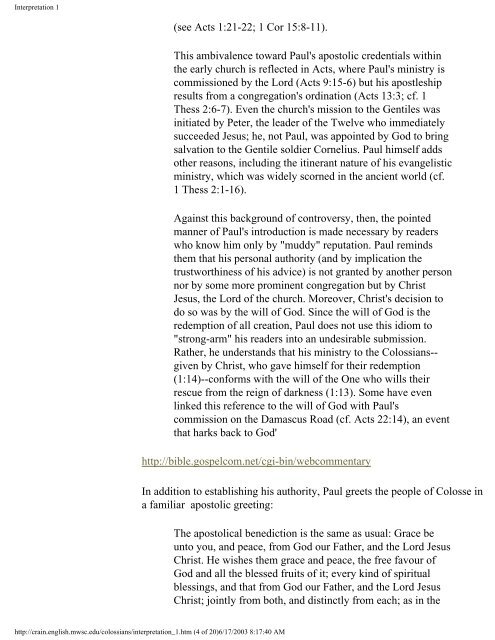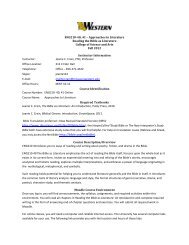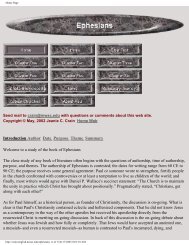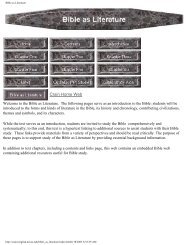Introduction to Colossians: Authorship, Date, Audience - Crain Home
Introduction to Colossians: Authorship, Date, Audience - Crain Home
Introduction to Colossians: Authorship, Date, Audience - Crain Home
You also want an ePaper? Increase the reach of your titles
YUMPU automatically turns print PDFs into web optimized ePapers that Google loves.
Interpretation 1<br />
(see Acts 1:21-22; 1 Cor 15:8-11).<br />
This ambivalence <strong>to</strong>ward Paul's apos<strong>to</strong>lic credentials within<br />
the early church is reflected in Acts, where Paul's ministry is<br />
commissioned by the Lord (Acts 9:15-6) but his apostleship<br />
results from a congregation's ordination (Acts 13:3; cf. 1<br />
Thess 2:6-7). Even the church's mission <strong>to</strong> the Gentiles was<br />
initiated by Peter, the leader of the Twelve who immediately<br />
succeeded Jesus; he, not Paul, was appointed by God <strong>to</strong> bring<br />
salvation <strong>to</strong> the Gentile soldier Cornelius. Paul himself adds<br />
other reasons, including the itinerant nature of his evangelistic<br />
ministry, which was widely scorned in the ancient world (cf.<br />
1 Thess 2:1-16).<br />
Against this background of controversy, then, the pointed<br />
manner of Paul's introduction is made necessary by readers<br />
who know him only by "muddy" reputation. Paul reminds<br />
them that his personal authority (and by implication the<br />
trustworthiness of his advice) is not granted by another person<br />
nor by some more prominent congregation but by Christ<br />
Jesus, the Lord of the church. Moreover, Christ's decision <strong>to</strong><br />
do so was by the will of God. Since the will of God is the<br />
redemption of all creation, Paul does not use this idiom <strong>to</strong><br />
"strong-arm" his readers in<strong>to</strong> an undesirable submission.<br />
Rather, he understands that his ministry <strong>to</strong> the <strong>Colossians</strong>-given<br />
by Christ, who gave himself for their redemption<br />
(1:14)--conforms with the will of the One who wills their<br />
rescue from the reign of darkness (1:13). Some have even<br />
linked this reference <strong>to</strong> the will of God with Paul's<br />
commission on the Damascus Road (cf. Acts 22:14), an event<br />
that harks back <strong>to</strong> God'<br />
http://bible.gospelcom.net/cgi-bin/webcommentary<br />
In addition <strong>to</strong> establishing his authority, Paul greets the people of Colosse in<br />
a familiar apos<strong>to</strong>lic greeting:<br />
http://crain.english.mwsc.edu/colossians/interpretation_1.htm (4 of 20)6/17/2003 8:17:40 AM<br />
The apos<strong>to</strong>lical benediction is the same as usual: Grace be<br />
un<strong>to</strong> you, and peace, from God our Father, and the Lord Jesus<br />
Christ. He wishes them grace and peace, the free favour of<br />
God and all the blessed fruits of it; every kind of spiritual<br />
blessings, and that from God our Father, and the Lord Jesus<br />
Christ; jointly from both, and distinctly from each; as in the






![[38cb1273][0][sourcelist][1][0] - Crain Home](https://img.yumpu.com/2168350/1/190x245/38cb12730sourcelist10-crain-home.jpg?quality=85)